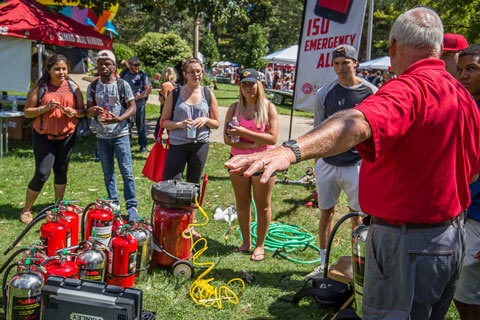Stay Informed

All students should sign up for ISU Emergency Alert, the University's emergency notification and warning system, learn about the range of emergencies that are most likely to occur in our area, and download the ISU App and the BirdWatch guide within the app. The BirdWatch guide allows students to:
- Access the Campus Emergency Guide
- Make a safety or crime report
- Find important public safety phone numbers
- Reach campus Care Teams
- Link to campus crime statistics and reports
Read and understand the ISU Emergency Management Plan
Be Prepared
Students are encouraged to always be prepared for any emergency.
- Carry a phone charger in your backpack
- Carry an emergency $20 for situations when the Debit/Cred Card system is off-line
- Build and have emergency kits ready to go
- Have a personal plan with roommates, friends, and family that identifies communications and rendezvous points in an emergency
ISU takes active shooter/aggressor preparedness seriously. In addition to information found in the BirdWatch Guide and in Flip Charts around campus, we present a number of on-campus training sessions. In addition, our friends at Ohio State University produced a 6-minute active shooter preparedness video, which mirrors how the Illinois State University community should respond.
Build a Kit and Plan
In case of an emergency, you should be prepared to be self-sufficient for up to 72 hours. A personal kit, in a backpack, should be ready to go in a moments notice; we encourage you to build a kit for your home and car. Water, food, medications, and batteries in both kits should be checked and replaced often.
Your family, friends, and roommates may not be together when an emergency happens, so it is important to plan in advance.
Plan to stay or go: depending on your circumstances and the nature of the emergency, the first important decision is whether you stay where you are or evacuate. You should plan for both possibilities.
Download, edit, and distribute an Emergency Planning Handbook which should be used between friends and roommates as well.
-
Home Kit
Items to have in your home kit:
- Water (at least one gallon, per person, per day)
- Non-perishable food
- Flashlight w/ extra batteries
- Clothes
- Extra blankets
- Medications/commonly used over-the-counter medicines
- First aid kit
- Cash
-
Car Kit
Items to have in your car kit:
- Water (at least one gallon, per person, per day)
- Non-perishable food
- Flashlight w/ extra batteries
- Cell phone charger
- Blankets/sleeping bag
- Clothes
- Knife
- First aid kit with medications/commonly used over-the-counter medicines
- Bag of sand (or cat litter)
- Shovel
- Windshield scraper and brush
- Tool kit
- Tow rope
- Road safety vest
- Flares
- Compass and local road maps
- Cash